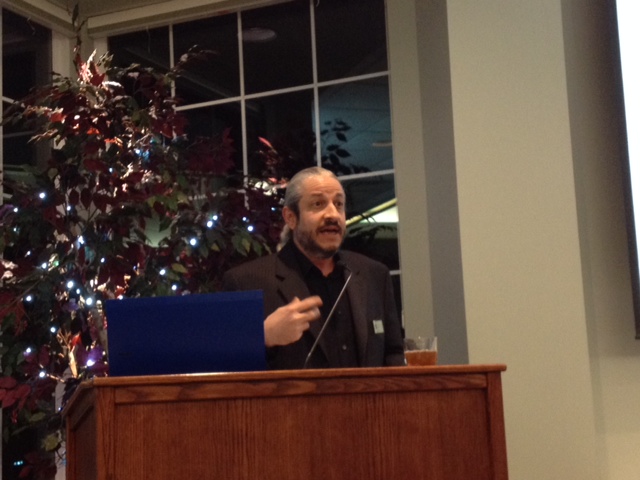At just about dusk Tuesday, Nov. 12, Stacey Zimmerman, assistant director of Called to Lead in the Office of the Chaplain and Religious Life, welcomed students and faculty and staff members to the Susquehanna Room, and asked them to consider how many people they interact with each day—those we work with and learn from. Then, she challenged the audience with this: “How often do we really think about who people are and what matters to them?”
That’s the idea behind the semi-annual Called to Lead event “What Matters to Me and Why.” Before dinner and conversation, a guest speaker—usually a faculty or staff member—answers that burning, namesake question.
Zimmerman said the dinner is meant to “deepen our appreciation of others, and encourage campus reflection and discussion on values, purposeful life work, life philosophy, ethical commitments.” Speakers are selected for several reasons, but most notably for “being comfortable being real.” This transparency is important because in addition to talking about motivation and leadership, speakers are encouraged to expose vulnerablilities, such as difficulties encountered personally and professionally.
This semester, Called to Lead welcomed Jesse Waters, director of Bowers Writers House and lecturer in English, who Zimmerman referred to as dynamic, engaging and easy to listen to.
At the podium, Waters explained that he couldn’t help but add an adverb—“most”—to help him narrow down what mattered to him: faith, hope and love. He added the caveat that “what matters?” is a fluctuating question; it can change over time. Waters took attendees back to his childhood and through adolescence and into adulthood—often revealing compelling, personal details—to explain how and why these three topics began to matter—and still hold importance now. A published author in various genres, naturally he sprinkled a bit of literature into his presentation: his own and writings of wordsmiths he admires.
I found a sense of self through a mix of religions…”
Waters began with faith. As a youngster, religion—all kinds—fascinated Waters, so much so he tore into books on Eastern religions and ancient philosophers: not the kind of reading material that would interest most prepubescents. He talked about his upbringing as a “ceremonial Jew”—meaning his family observed a few Jewish holidays, but they also celebrated Christmas. He joked that he’s not even really a man—he’s never been “Bar Mitzvah’d.” Through an excerpt from Jew Boy, his memoir-in-progress, he shared a pivotal moment in his self-identity; Soon after his entry into high school a classmate told Waters, in schoolyard fashion, what being Jewish meant.
“I found a sense of self through a mix of religions,” Waters said. “Faith was complex.”
Waters spoke about how and why hope and love matter, through poems and stories about joy and pain—and how and where those two feelings can intersect. He explained that his parents had three requirements for him when he was growing up: be happy, productive and honest. Waters said he was none of those until he discovered poetry—he learned to write his way out of pain.
“[Writing] gave me faith, confidence and hope,” he said. “It was ridiculous, sappy and intelligible, but it was mine.”
[Writing] gave me faith, confidence and hope…”
Waters concluded by thanking the audience for allowing him to share “… a bit of who I am, where I’m from and the journey I’ve been on…” and for taking a glimpse into “the essence of who I am—a writer and a teacher.”
Following the talk, about 80 attendees—a mix of students and faculty and staff members—shared dinner and, guided by a hand-out of talking points, discussed what mattered to them. Zimmerman said Waters’ use of poetry took some students out of their comfort zones and led at least one table to start a dialogue about the importance of liberal arts.
But it all goes back to the idea of asking someone to share what’s important, allowing students and employees to see someone through a different lens—not just a coworker or professor.
“It’s very neat that Jesse used poetry because that’s who he is,” she said. “It’s what matters to him.”
* * *
EXTRA: ‘What Matters’ Facts
According the Rev. Tracy Wenger Sadd, chaplain, director of Religious Life and executive director, purposeful life work and ethical leadership, “What Matters to Me and Why” began at Elizabethtown College in 2007. Dr. E. Fletcher McClellan was the first speaker. The program began in the 1980s at Princeton and was picked up at Stanford in the 90s. Since, the series has been used at many other schools. Sadd explained the program has these main goals:
- Create conversation about important issues including leadership, values, beliefs, motivations, actions, choices made, difficulties encountered, and commitments solidified over a lifetime
- Help students and others better understand the lives and inspirations of those leaders who shape the academic life
- Find out what really matters to the members of our campus community



